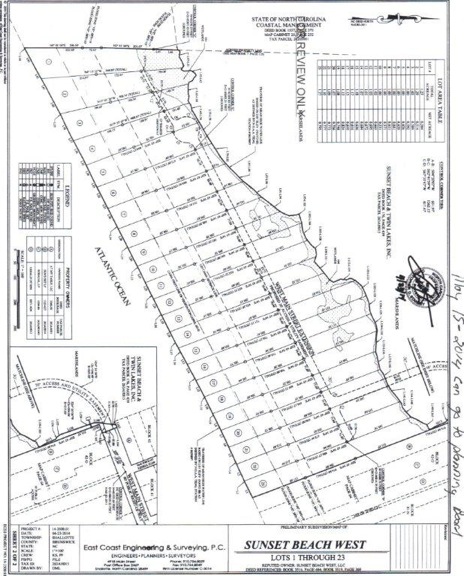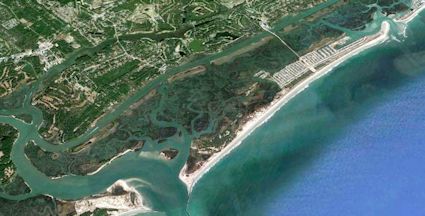 The site plan for the proposed Sunset Beach West subdivision consists of 25 acres and 21 lots that stretch from the ocean to the marsh. Brunswick Could could be cut off from future federal funding and grants if it extends water and sewer lines to the development. Source: Sunset Beach |
SUNSET BEACH — If it connects its public utilities to a proposed development in Sunset Beach, Brunswick County could be cut off from future federal funding, according to the U.S. Fish and Wildlife Service.
A Jan. 6 letter from the federal agency to the town explains “possible” implications if Brunswick County Public Utilities provides water and sewer connection to Sunset Beach West.
Supporter Spotlight
The proposed neighborhood of 21 oceanfront lots is one developers aim to build, with or without the ability to tap into the county’s system, in a federally designated Coastal Barrier Resources Act, or CBRA (pronounced “cobra”) zone.
Congress passed CBRA in 1982 to discourage building on relatively undeveloped barrier islands by cutting off federal funding and financial assistance to those who build in these zones.
The fish and wildlife service has asked the town and county to provide the agency with documents showing when and from which federal agency the public utility has received federal funding assistance for projects associated with Sunset Beach utilities after Oct. 1, 1983 when CBRA zones were established.
If the utility has not received any federal funding after that date “or expect to in the future, then there is no federal nexus to the CBRA, and the proposed Sunset West utility connection will not hinder future federal funding received by the Town,” wrote Pete Benjamin, field supervisor for the service’s Raleigh Ecological Services Field Office.
Benjamin did not return calls seeking comment.
Supporter Spotlight
The utility earlier this decade extended sewer to the town, which considered the service a major goal of Sunset Beach’s land-use plan and one that “will begin the process of healing the currently closed shellfish areas,” according to the town’s 2011-2012 annual report.
The county received a construction grant and low-interest loan from the N.C. Department of Environment and Natural Resources for the construction of the mainland sewer system in the town, according to the letter.
Brunswick County has also received low-interest construction loans from DENR to build the utility’s West Brunswick Water Reclamation facility and the Northeast Brunswick Regional Wastewater System. The county was also granted at least one State and Tribal Assistance Grant from the Environmental Protection Agency for water main construction “over the past ten years,” Benjamin wrote.
“It is also our understanding that the County hopes to continue to receive federal funds from these same sources in the future,” he wrote.
Jerry Pierce, the county’s director of public utilities, wrote in an email response to questions for this article that the county has received within the past 30 years “a limited number” of grants and federally subsidized loans.
“The (USFWS) letter and its implications are under review by the county attorney,” Pierce wrote.
In what Benjamin refers in his letter as a way to “circumvent” CBRA restrictions, county commissioners last September unanimously approved a policy allowing the installation of taps and meters outside of a CBRA designated area to serve property within the zone. The policy requires that the developer own and operate water and sewer mains built within CBRA.
 The proposed developed would be between the western end of Sunset Beach, the rectangular area in the photo, and Bird Island Reserve. Photo: Google |
A portion of the roughly 25 acres proposed for development does not fall within the CBRA area. This is where developer Sammy Varnum has asked to tap into the county’s utilities.
“We have a letter saying they will serve us,” Varnum said during a Jan. 15 meeting of the town’s Technical Review Committee.
That committee consists of various town staff who work with developers to make sure development plans meet local building requirements before the plans are reviewed by the town planning board.
Based on a 1987 determination about what is and is not permissible in CBRA zones, the county utility may not be able to fulfill the developers’ request without losing out on future federal grants and loans.
Thus was the determination in a case in Brevard County, Fla., where the county wanted to extend a sewer line from an existing federally funded sewage treatment plant to and across a CBRA zone along a U.S. highway right-of-way.
An April 13, 1987 letter from the U.S. Department of Interior concluded that extending service from the sewage treatment plant to properties within the CBRA zone “is absolutely prohibited.”
Though a deterrent, CBRA does not prohibit developers from building in these hurricane-prone, biologically rich areas on the nation’s coastlines.
The land in question was once Mad Inlet, a shallow channel that once separated the west end of Sunset Beach from the Bird Island Reserve until the it dried up in the early 1990s. The closure left a stretch of more than 1,600 feet of pristine beach between the end of the town’s Main Street and the reserve.
The N.C. Coastal Resources Commission last year removed the land from its designation as an inlet hazard area, a decision the town board opposed out of concern that the land may be developed and the inlet eventually reopen.
As long as the developers of the proposed Sunset Beach West meet the town’s core requirements the town cannot prohibit building on the land, Susan Parker, Sunset Beach administrator, said.
Preliminary plans, which include a private wooden bridge crossing over marsh and wetlands to the property, will eventually be submitted to the town planning board for review.
The development will require a Coastal Area Management Act major permit from the state and a CAMA minor permit, issued by the town, for each lot.
Varnum made it clear following the Jan. 15 meeting that plans for the development will proceed, even if that means installing on-site wells and septic systems and generators and solar panels on each home.
“We’ve asked for a letter of determination and until we get that everything’s pending,” he said. “We do plan to move forward with or without the public utilities. We’ll be self-sufficient. We’re going to develop that land. No doubt about it.”







